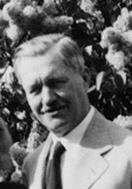Nikolaus von Üxküll-Gyllenband
| Nikolaus Graf von Üxküll-Gyllenband | |
|---|---|
 | |
| Born |
14 February 1877 Kőszeg, Austria-Hungary |
| Died |
14 September 1944 (aged 67) Berlin, Germany |
Nikolaus Graf von Üxküll-Gyllenband (14 February 1877 – 14 September 1944) was a German businessman who took part in the 20 July plot.
Nikolaus von Üxküll-Gyllenband was born in Kőszeg (German: Güns), Austria-Hungary and joined the Austro–Hungarian Army prior to the First World War.[1] After the war Üxküll worked as a businessman in Germany. He was an uncle of Claus von Stauffenberg. In autumn 1939 Üxküll and Fritz-Dietlof von der Schulenburg contacted Stauffenberg and tried to win him for a coup d'état against Hitler.
In the planning of the 20 July plot Üxküll was supposed to become the liaison officer for the military district of Bohemia-Moravia. After the plot failed Üxküll was arrested by the Gestapo on 23 July 1944. Üxküll gave the atrocities in the Nazi concentration camps as the reason for his involvement in the plot. He was sentenced to death by the Volksgerichtshof on 14 September 1944 and killed the same day in Plötzensee prison next to Heinrich Graf zu Dohna-Schlobitten, Hermann Josef Wehrle and Michael Graf von Matuschka.[2]
References
- ↑ Biography at German Resistance Memorial Center
- ↑ Biography of Michael Graf von Matuschka (in German)
Notes
Regarding personal names: Graf was a title before 1919, but now is regarded as part of the surname. It is translated as Count. Before the August 1919 abolition of nobility as a legal class, titles preceded the full name when given (Graf Helmuth James von Moltke). Since 1919, these titles, along with any nobiliary prefix (von, zu, etc.), can be used, but are regarded as a dependent part of the surname, and thus come after any given names (Helmuth James Graf von Moltke). Titles and all dependent parts of surnames are ignored in alphabetical sorting. The feminine form is Gräfin.